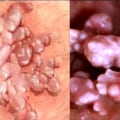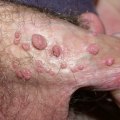Condyloma acuminata (genital warts) is a sexually transmitted infection (STI) that causes small, pink or skin-colored bumps on the lips, in the opening of the vagina, or around or inside the anus. It is one of the most common STIs in the United States and can be spread through vaginal and anal sex, sharing sex toys, and, rarely, through oral sex. Fortunately, treatment at a sexual health clinic can help. The HPV vaccine offered to girls and boys in the United Kingdom to protect against cervical cancer also helps protect against genital warts.
If you have genital warts, your current sexual partners should be tested because they may have warts and not know it. Using a condom every time you have vaginal, anal, or oral sex is the best way to avoid spreading genital warts to your partner. You may have heard that some types of HPV can cause cancer, but they are not the same types that cause genital warts. Genital warts are caused by a virus called human papillomavirus (HPV).
Limiting the number of sexual partners and getting vaccinated will help prevent you from getting genital warts. It may not be possible to find out who had the genital warts from or how long they had the infection. If you think you may have genital warts, you should schedule an appointment with your GP or contact local sexual health services. Genital warts can also develop in the mouth or throat of a person who has had oral sexual contact with an infected person.
You can see a family doctor, but they'll probably refer you to a sexual health clinic if they think you might have genital warts. However, on rare occasions, genital warts can multiply in large groups in people with a weakened immune system. You can get warts even if you use condoms or don't have penetrative sex, since a condom doesn't cover all of your genital skin. Using a condom every time you have sex is a good idea, but it won't necessarily protect you from genital warts.
The HPV vaccine offered to girls and boys aged 12 to 13 in England protects against cervical cancer and genital warts. If you are diagnosed with genital warts, there are several treatment options available. Your doctor may recommend topical creams or ointments that can be applied directly to the affected area. These medications work by killing the virus that causes the warts. Other treatments include cryotherapy (freezing off the wart), laser therapy (burning off the wart), and surgical removal of the wart. Genital warts are highly contagious and can be spread through skin-to-skin contact.
The best way to prevent them is to practice safe sex by using condoms and limiting your number of sexual partners. Vaccination is also recommended for those who are at risk of contracting HPV. If you think you may have genital warts, it is important to seek medical attention as soon as possible.










